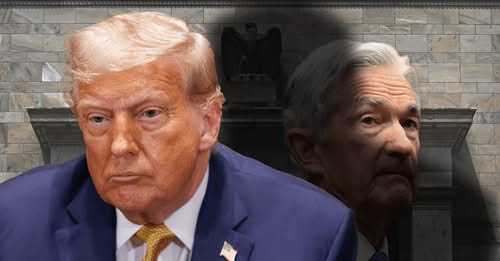
President Donald Trump is considering replacing Jerome Powell, the current chair of the U.S. Federal Reserve, before his term officially ends in May 2026. This move has raised concerns about the independence of the Federal Reserve and its potential impact on financial markets.
Trump’s Intentions and Criticism of Powell
President Trump has openly expressed his dissatisfaction with Jerome Powell, criticizing him for keeping interest rates too high. He has called Powell “terrible,” “very stupid,” a “major loser,” and a “numbskull.” Trump has indicated he has “three or four” potential replacements in mind and has stated he would prefer “anybody but Powell.”
Although Trump cannot legally remove Powell from office before his term concludes due to the Federal Reserve’s independence and a recent Supreme Court ruling, he seems determined to influence the Fed’s future direction.
The “Shadow Fed” Concept
The idea of a “shadow Fed chair” involves Trump potentially announcing a successor to Powell significantly earlier than usual (possibly as early as September or October 2025). This strategy aims to diminish Powell’s influence by creating a scenario where the announced successor, operating without formal authority, could sway market expectations and policy direction before officially taking office. This concept was reportedly first floated by current Treasury Secretary Scott Bessent.
Why a “Shadow Fed” Could Cause Problems for Markets
- Market Confusion and Uncertainty: An early announcement could confuse markets by forcing them to monitor the monetary policy commentaries of both Powell and his replacement, leading to conflicting signals. This “two Fed Chairs” scenario could create significant uncertainty.
- Undermining Fed Independence: Many experts widely view this move as an unprecedented attempt to undermine the Federal Reserve’s traditional role as an autonomous arbiter of U.S. monetary policy. Undercutting Powell in mid-term could shred the institution’s insulation from partisan imperatives.
- Risk of “Lame Duck” Status for Powell: An early selection could make Powell a “lame duck” in his final months, potentially increasing the risk of earlier interest rate cuts.
- Impact on Dollar Credibility and Interest Rates: Announcing a successor early could undercut the credibility of the dollar and lead to rising interest rates—precisely the opposite of what Trump aims to achieve. Bond markets could perceive the U.S. government as more risky if markets consider the new pick a “Trump loyalist.”
- Hesitation from Nominees: Potential nominees might be hesitant to be named so early, as it could undermine their credibility.
- Limited Practical Impact on Policy (Debated): While some experts express significant concern, others believe an early announcement might have limited practical impact on the Federal Open Market Committee’s (FOMC) monetary policy decisions, as the FOMC makes decisions by vote, and the “shadow” chair would wield no actual power before assuming the role. However, public comments contradicting Powell could “aggravate the FOMC,” potentially leading to an “open or silent revolt.”
Potential Candidates to Replace Powell
Several individuals have been mentioned as potential contenders for the Fed chair position:
- Scott Bessent: Current Treasury Secretary, known for close alignment with Trump. He has also floated the idea of a “shadow Fed chair.”
- Kevin Warsh: Former Fed Governor (2006–2011), often seen as pragmatic and independent, though his historically hawkish tilt may conflict with Trump’s desires for low interest rates.
- Christopher Waller: Current Fed Governor and one of the more dovish voices on the board. He has expressed openness to cutting rates.
- Kevin Hassett: Former chair of Trump’s Council of Economic Advisers and a vocal advocate for tax cuts and stimulus.
- David Malpass: Former World Bank President.
- Michelle Bowman: Currently serving as the Federal Reserve’s vice chair for supervision. She recently called for a cut in rates.
The situation remains fluid, with ongoing tensions between President Trump and Federal Reserve Chair Jerome Powell, and significant debate surrounding the implications of an early successor announcement.


